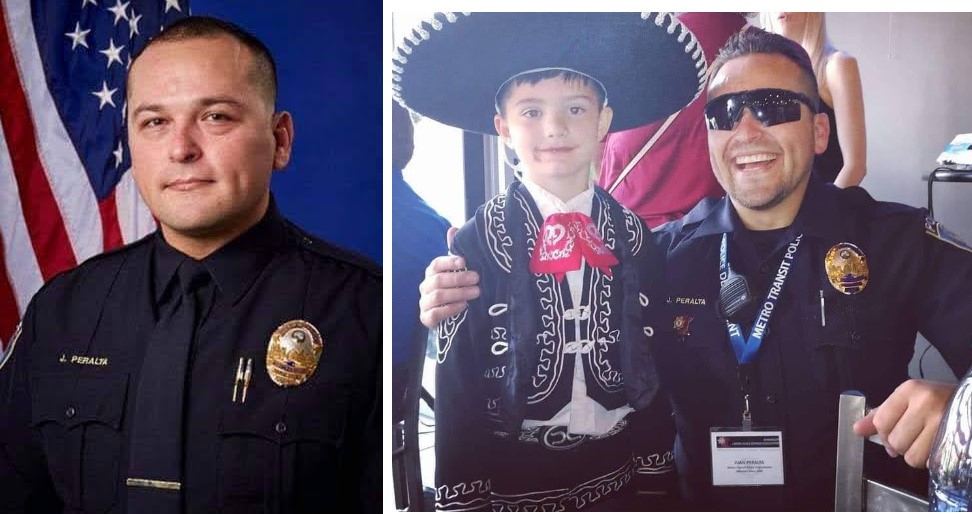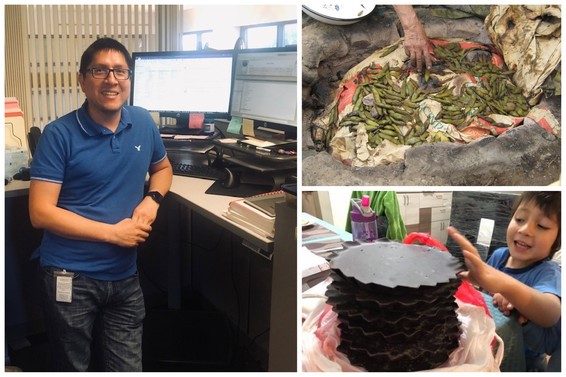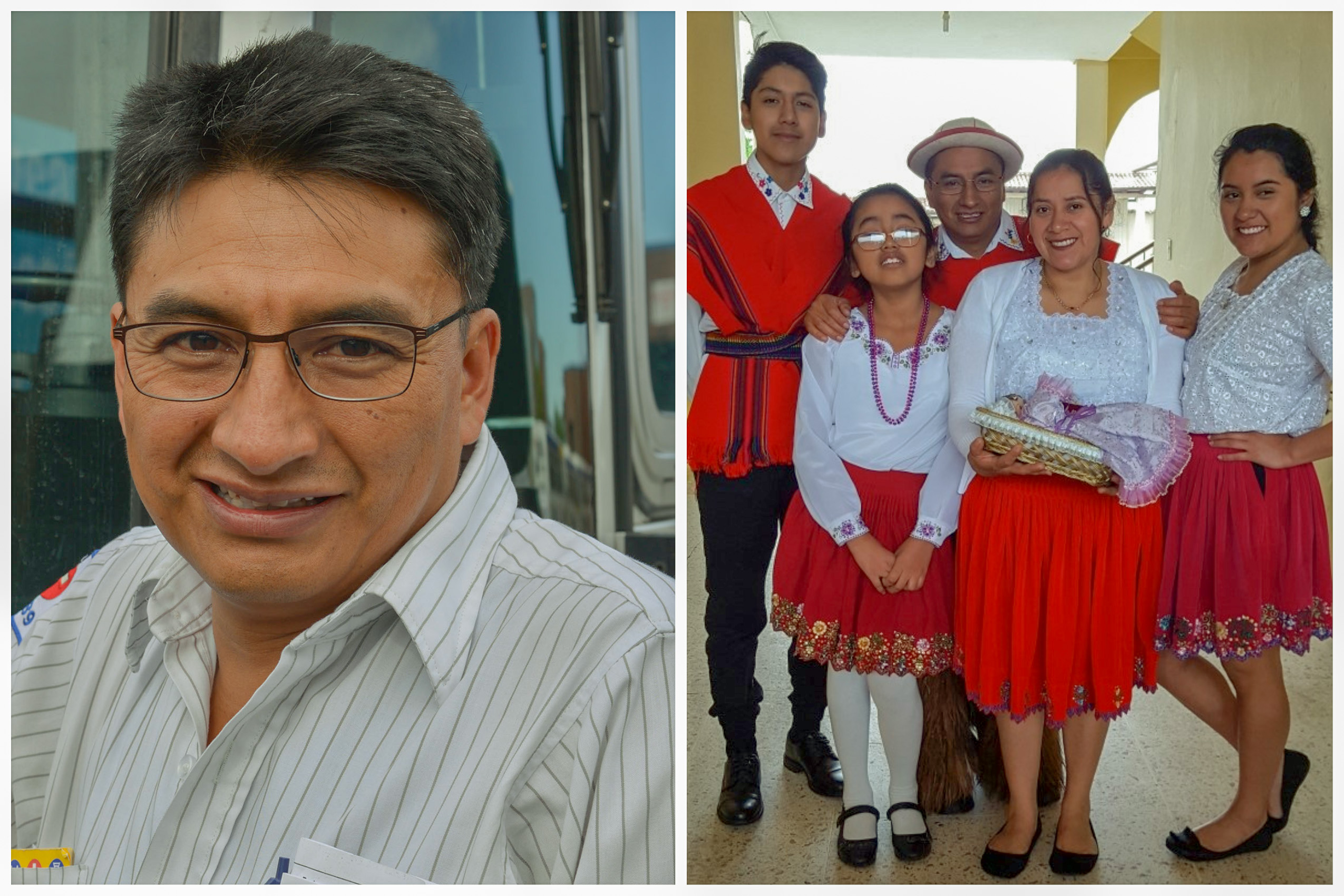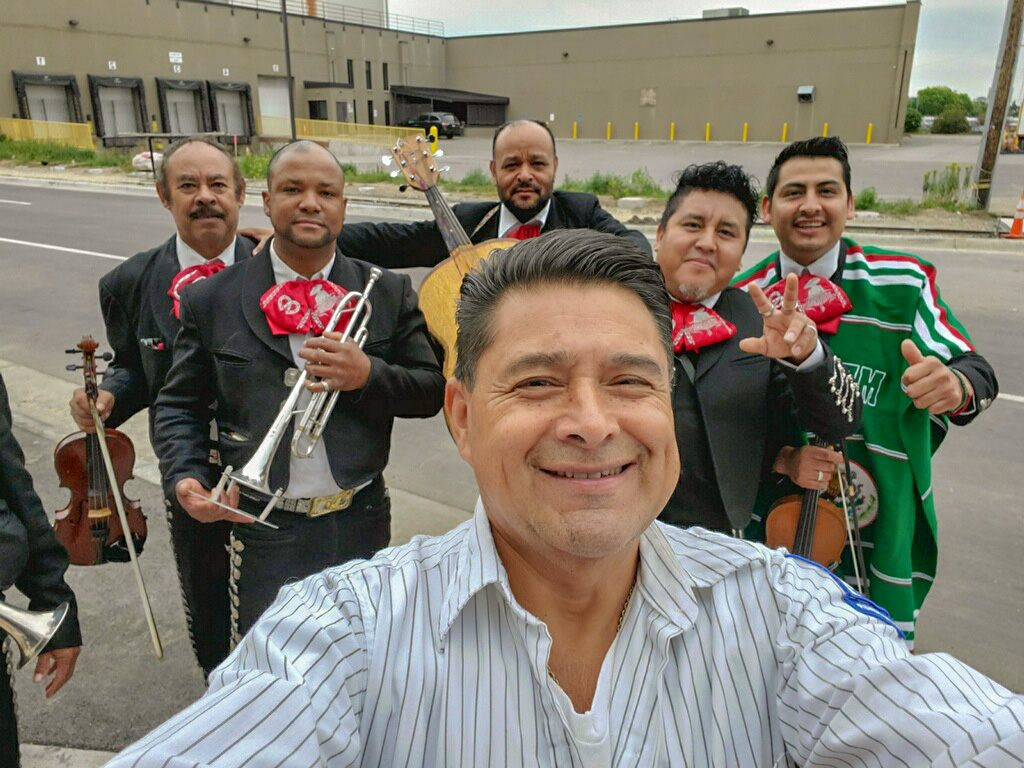National Hispanic/Latino Heritage Month is September 15 through October 15. To commemorate, we invited employees to talk about how they celebrate their culture during this time and throughout the year. Learn more at hispanicheritagemonth.gov.

Juan Peralta, Police Officer
Please share a little bit about your background.
I was born in Mexico City to parents whose ancestry originates from Spain, Andorra and France. My family immigrated to Mexico in the 1800s via Veracruz and mixed with the native indigenous. These origins are very typical of Latino families. That’s what creates our culture today, a mixed heritage. I moved to Minnesota in 1993 and attended Eagan High School and later the University of St. Thomas.
How did you get into law enforcement?
After school, I wanted to join the Army and become a police officer, which is not very characteristic of Latinos. My family wanted me to continue the family business, but I convinced my mom to sign a waiver at age 17 to let me join the U.S. Army. I was deployed to Kosovo, Iraq, Afghanistan and Guantanamo Bay, Cuba, where I was a military police supervisor of detention operations. I’m now in my 25th year of service. I joined Metro Transit in 2015 and currently work overnight patrol at West Command and am part of the Honor Guard and Bike Rapid Response Team.
I’m also the treasurer of the National Latino Officers Association – Minnesota Chapter. We have members of all ethnicities and celebrate Latino culture together. We conduct youth outreach, set up academic scholarship for college students, mentor, coach and train future police officers. Most importantly, we connect with vulnerable populations and advocate for Spanish-speaking families who need assistance navigating Minnesota’s criminal justice system.
How do you celebrate your culture today?
Like most Latino families, my family celebrates Easter and Christmas. But in Latin America there is no bunny in Easter and Santa Claus is not the primary figure of Christmas – those are the three kings or “Los Reyes Magos,” who are celebrated on January 6. We also celebrate Cinco de Mayo, which commemorates Mexico’s defeat of the French in 1862, and Mexico’s independence from Spain in September. That’s what really validated the Mexican people, when they could have their own government and were no longer being taxed by the Spanish crown. We go to parades and block parties and make authentic food such as Menudo, a spicy pork soup.
Can you introduce us to a Hispanic/Latino artist or musician you enjoy?
When I was younger and living in Mexico City, I listened to Café Tacuba, a Spanish alternative rock and Latin hip-hop band that became popular in the early 1990s. After they appeared on MTV Unplugged, they became more popular in the U.S. They’re mostly influenced by folk music traditions, and they tell stories about Mexico City’s neighborhoods and its people, known as Chilangos.

Juan Villanueva, Project Manager
How does your family celebrate Hispanic Heritage Month?
Unfortunately, my wife and I grew up in a time where immigrants and their descendants were encouraged to immerse themselves into American culture, so we haven’t kept our Latin culture alive. In recent years, we started to rediscover our culture and started participating in multicultural events like Cinco de Mayo or Peruvian Independence Day celebration. In all, we are just starting to revive our cultural values and Latino roots in our family.
How do you celebrate your culture today?
Like many other cultures, Latinos build cultural legacy through food and family gatherings. Our family is no exception. Around the dinner table, we share stories about growing up in a Peruvian family, how it was for us to stay up late playing outside with neighborhood friends or how strict our parents were about schoolwork. My kids love to hear stories about my parents. Through these stories, they are learning how much we value family and that we would do anything for each other. They are also learning about respect, hard work, and the importance of education. We also introduce them to Latino cooking in addition to American cuisine. We are doing our best to create a blend of both cultures in my family.
Is there a cultural tradition, history, artist, musician, sport, that you’d like to share and introduce us to?
In Peru, the main Christmas celebration happens on Christmas Eve. It’s a whole day endeavor, starting with dusting off big pans, going to the market to buy fresh ingredients or rearranging the house to fit many people. All this work to prepare a wide range of traditional dishes and drinks which were accompanied by fireworks ALL night long. Throughout the day, it is a tradition to have paneton (Italian-style fruit bread) and hot chocolate made with real chocolate. I have fond memories of Christmas when my close relatives and friends would come to my parents’ house and my dad traveling to the countryside to get pure chocolate from local cocoa growers. When hot chocolate is made with real chocolate it is a different experience. Not even Godiva stands a chance.

Fausto Cambi, Operator
How do you celebrate your culture today?
My wife and I grew up in Ecuador and we pass on our culture to our three children. We celebrate by remembering where we came from, educating my children about our traditions back home, explaining to them what it’s all about and preparing dishes using my ancestor’s recipes.
How do you and/or your family celebrate Hispanic Heritage Month?
We celebrate with our community by wearing traditional embroidered Ecuadorian clothes. We wear this when we gather at events to dance to Andean music, which has lots of flute and panpipes. Our church is another place we gather with friends and family to eat traditional food, which has a lot of rice, beans, potato, and roasted pork.
Is there a cultural tradition, history, artist, musician, sport, you'd like to introduce us to?
In Minnesota, there’s an Ecuadorian group called Ecuador Manta. They play traditional Andean music. They have free concerts throughout the state during the summer, including the Minnesota State Fair.

Antonio Castro, Operator
Tell us a little about your cultural background.
I was raised in Mexico City and part of being Mexican is that you have roots to the past – not just with Spanish culture but also indigenous culture. Mexico City existed hundreds of years before the Spanish arrived, so we have a mix of cultures and a sense of strong spirituality.
How do you and/or your family celebrate Hispanic Heritage Month?
My wife and two kids and my brothers all get together to make tamales using my late mother’s recipe. It helps us to remember and celebrate her life. We go to specialty stores to gather all our ingredients to help us with not just the tamales but the big meal we’re about to share. And, of course, there’s plenty of good music, beer, and tequila.
What is a cultural tradition that's important to you?
Growing up in Mexico City, I played soccer and was a defender. I always loved the sport and, in Mexico, it’s not just a sport – it’s a religion. Everyone is that dedicated to it. Growing up, I wanted to be just like Javier Hernandez, better known as Chicharito, who played for our team, then moved to European teams like Real Madrid and Manchester United. I still root for him as he plays for the LA Galaxy and the Mexican national team.